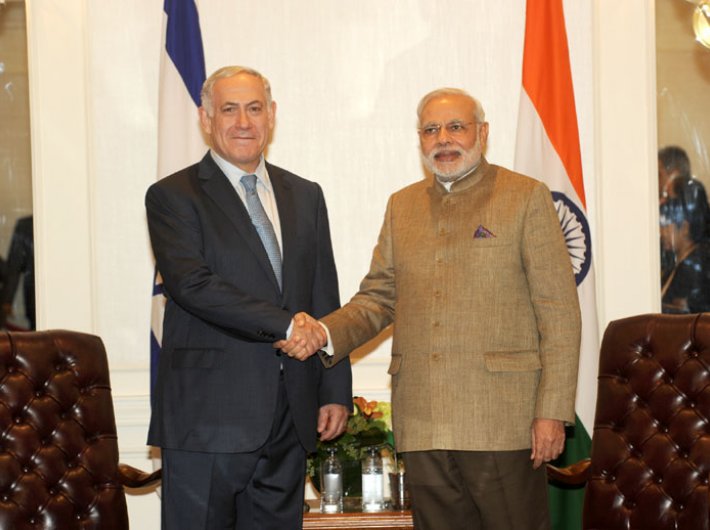Narendra Modi’s visit to Israel will see a new phase in New Delhi’s West Asia engagement
Narendra Modi is all set to become the first Indian prime minister to visit Israel where he lands on July 4 and leaves for home on July 6. It will also be the first time that an Indian leader visiting the West Asian nation will not visit Palestine, a departure from the past that has been tweaked under the new dispensation at the Centre.
In October 2015, when president Pranab Mukherjee undertook his West Asia visit, it was ensured that he moved towards Palestine too. This was done in accordance with India’s policy of maintaining balance in relationship with both Israel and Palestine.
External affairs Minister Sushma Swaraj too had followed the same script. Like president Mukherjee, she landed first in Palestine on January 17, 2016 and then took land route to reach Israel the next day. A glimpse of de-hyphenation in India’s engagement with these two important West Asian countries was before the world when National Security Adviser Ajit Doval visited Israel in March without touching Palestinian soil.
Obviously, foreign policy and strategy never trek along stagnant, isolated and moribund route. It takes a move, sometime drastic one, in pursuance of a nation’s objective. It was seen in April 2016. India had joined 32 countries in condemning Israel for its excavation and exclusion policies around the Al-Aqsa mosque in Jerusalem. But when it came for voting on a resolution against Israel on the similar issue on October 18, 2016, India absented from the move.
No plausible reason was given for this U-turn, but it was clear that New Delhi’s diplomatic priority changed under the Modi administration which looks at Israel for ‘Make in India’ initiative, for its quest for innovations and technology, for defence purchase, cyber security, ‘Namami Gange’ project and others.
Moreover, Israel matters to India to keep the US on its side on all major international issues. And then in consonance with rising global profile of India, decision makers concentrate more on national interest than ideologies and symbols. Perhaps, Palestine doesn’t fit in to that bracket. But that doesn’t mean leaving Palestinians to their own fate.
India’s stand is that comprehensive resolution of decades long Israel-Palestine conflict could be addressed only through sustained political dialogue and peaceful means only. India is for the early resumption of dialogue between Israel and Palestine. In terms of assistance, India is among a few non-Muslim countries which works to uplift and progress of Palestine and its people. Under South-South cooperation, India has set up centre of excellence in IT and innovation in Ramallah and several vocational training centres across Palestine. India is also involved in establishing a techno park in Ramallah and institute of diplomacy, and India-Palestine Centre of Excellence in ICT in Gaza. Despite this, the Indian prime minister will not undertake a visit to Palestine.
However, in order to keep Islamic countries of the Middle-East in good humour and save the country’s neutral image from any damage, India invited Palestinian president Mahmoud Abbas on May 16 to New Delhi for summit level meeting. It is unclear when Modi will himself go to Palestine. Nevertheless, India under Modi is doing what the country couldn’t do under previous governments. It has embraced Israel as the latter is known for its technology and expertise to deal with terrorism.

